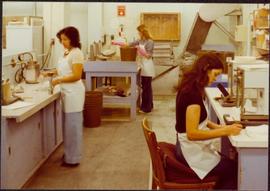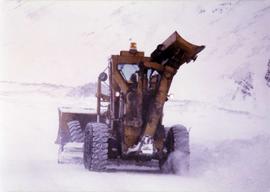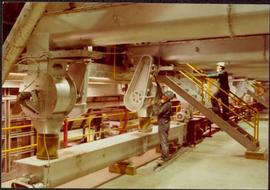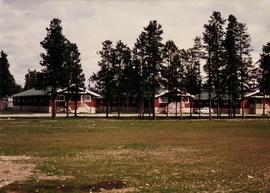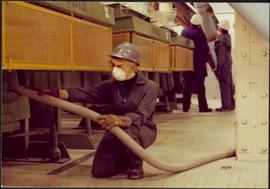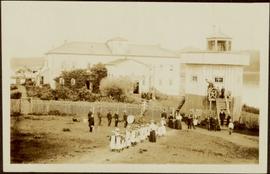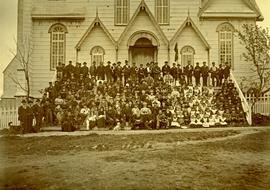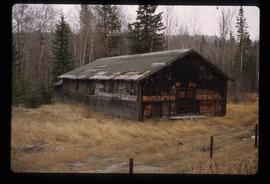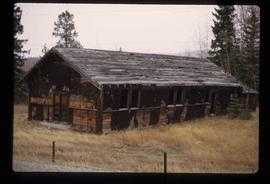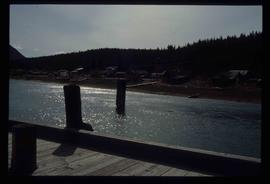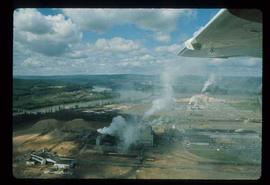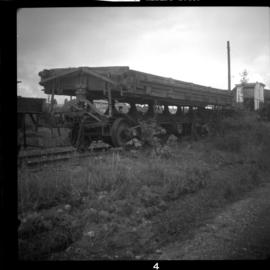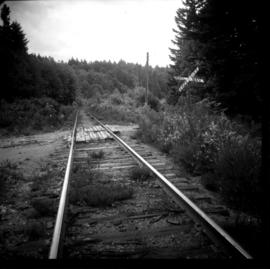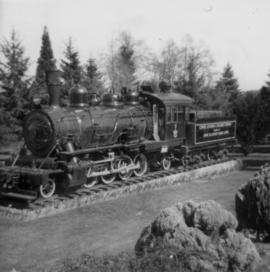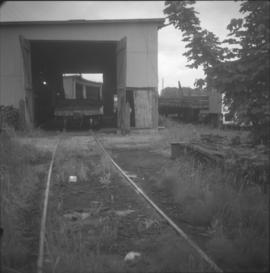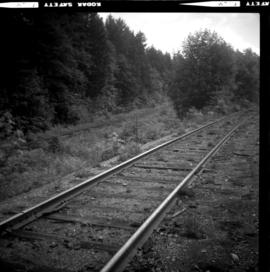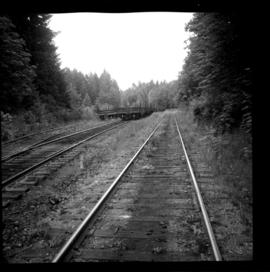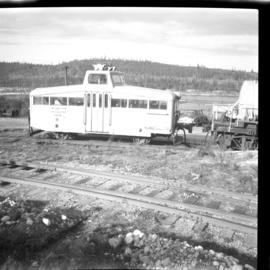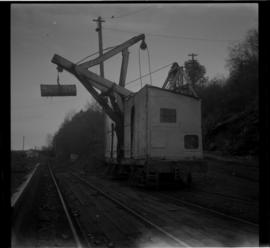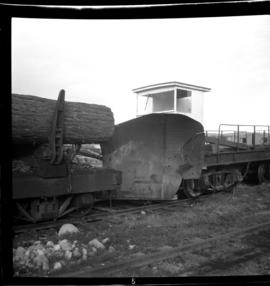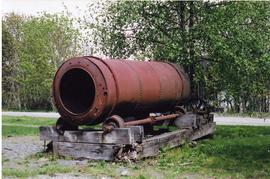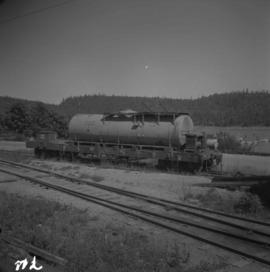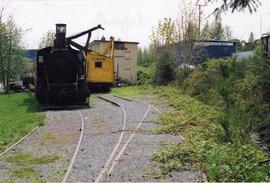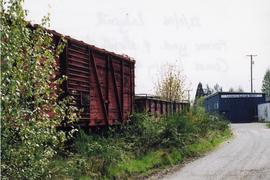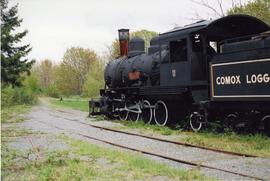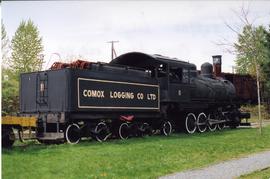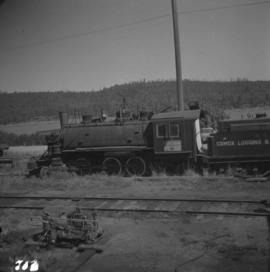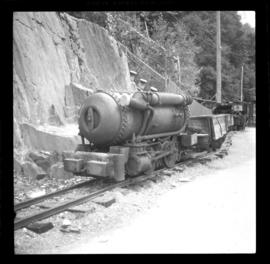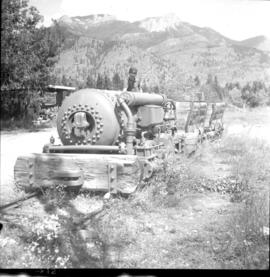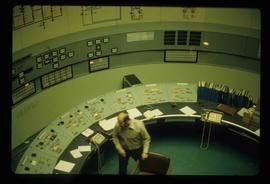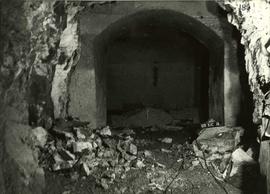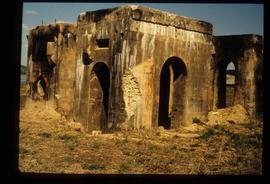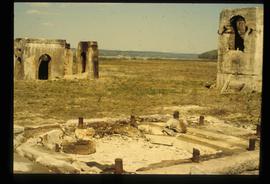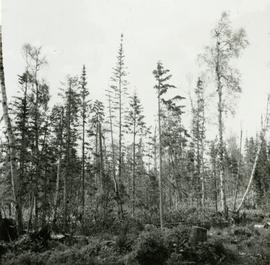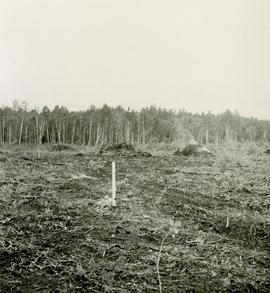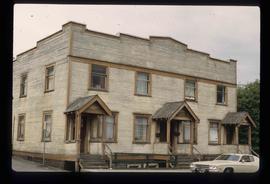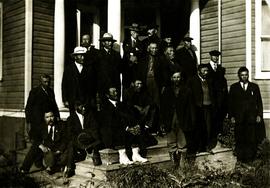Photograph depicts three women wearing white aprons while conducting tests on asbestos fibre in lab area, miscellaneous equipment throughout room.
Photograph depicts wheel bulldozer in snowy unknown area of mine.
Photograph depicts part of the vacuum dust control and removal system in the Cassiar mill building. Unidentified man can be seen at rotary air-lock, in which heavy blown dust would collect before dropping to plenum conveyor resting just above floor. From here, the dust would eventually be expelled at the tailings pile outside of the mill. Second unidentified man can be seen climbing steps in background. This section of the mill was located above the lab.
Photograph depicts three long panabode buildings behind trees across from ball park. Power lines and other buildings visible in background. The winter bunkhouses contained double occupancy rooms with a common bathroom, and were distinguished from the summer bunkhouses which were generally considered less accommodating (see item 2000.1.1.3.19.84).
Photograph depicts Zora Ivanovska in safety gear, vaccuming asbestos dust from "hall screen" in mill (slanted vibrating tables with varying mesh sizes, used to separate different lengths of fibre). Mill General Foreman Tony Pinto is visible on far right, with unidentified man.
Photograph depicts a group of children dressed in white walking in a line, and adults and other children watching from behind. Group of six man stand in line on left, one holding a flag, another a drum. Jail tower and large building stand behind fence in background.
Handwritten annotation on verso reads: "Old Mission House & jail at Metlakatla Before the fire."
Large group of women, men, and children pose on front steps of church. Some men standing in back hold brass instruments. Bishop Ridley (with long beard) sits in front centre between W.H. Collison (on right) and his son W.E. Collison. Photograph depicts the first church built in Metlakatla, which was burned in a fire in 1901, and replaced in 1903.
Handwritten annotation below image reads: "A gathering of Missionaries and Indians in front of Metlakahtla Church During Synod"; on verso: "[Ven?] Arch Collison & Mrs Collison".
Image depicts the old community hall in Woodpecker, B.C.
Image depicts the old community hall in Woodpecker, B.C.
Image depicts what appears to be a small community on the shore of a lake. The location is uncertain.
Community - Prince George.
Photograph depicts ballast car #175 built by Western Wheeled Scraper Company, Aurora, Illinois.
Photograph depicts a Comox Logging and Railway Company grade about a mile north of the diamond crossing. Track was used once daily for a train of about 20 cars. The grade was first built as a private railway between the Extension Mine and Ladysmith circa 1900-1925, then the section between Ladysmith and Nanaimo River was converted to a logging railway in about 1935-1940 and was extended up Nanaimo River Creek.
Photograph depicts a small yard switcher used to switch cars in and out of repair shops. It was in use when the photograph was taken.
Photograph taken half of a mile north of the diamond crossing. Visible is a distant signal protecting the crossing. Davies noted that it had not been used for many years.
Photograph depicts the last logs being removed from a 20 car log train which had just arrived from Nanaimo Lakes. Each car held 2 bundles, each of about 20 logs. These in turn were assembled into a large boom and then were towed to the mainland. Cars were emptied by a mechanical prodder and mounted on an old shay frame.
Photograph depicts the division of Crown Zellerbach Canada Ltd in Ladysmith.
Photograph depicts the division of Crown Zellerbach Canada Ltd in Ladysmith. Visible is a fire car with a former locomotive headlight attached to it.
Photograph depicts a homemade snow plough that had a short wheel base between the trucks. The design of its main frame suggets that it might have been a crane before conversion to its present use.
Photograph depicts a former steam locomotive shed.
Photograph depicts a view of the Ladysmith yard, looking north, about 300 yards east of the city centre.
Photograph depicts the outside of the Comox Logging head office in Ladysmith.
Photograph depicts a daily log train from Nanaimo Lakes. About 20 cars were being unloaded at a rather fast rate of 30-60 seconds per car using a mechanical prodder mounted on the frames of an old shay locomotive.
Photograph depicts a deisel switcher #107.
Photograph depicts a grand view of the Ladysmith yards. There had been no steam operations on this line for about 2 years.
Photograph depicts the lower part of the Ladysmith yard, adjacent to a log pond. A semaphore signal was activated by the tide and indicated to the engineer of the log train the suitable depth for offloading logs from the cars.
Photograph depicts a log car repair shop. Visible is one car being repaired as well as another awaiting attention on a switch spur on the right.
Photograph taken about half a mile north of the diamond crossing, looking southeast at the point where the Esquimalt & Nanaimo Railway closely follows the Comox Railway for about 300 yards. The Comox Railway used one every week for log trains.
Photograph depicts sidings for empty log cars about a quarter of a mile south of the diamond crossing. Image captured looking south, towards the Ladysmith yards. The running line is visible on the right side of the photograph and was used week by a daily log train, consisting of a deisel locomotive and 20 cars.
Photograph depicts deisel switcher #108.
Photograph depicts a mobile crane used to offload log trains into a pond.
Photograph depicts a snow plough in the Ladysmith yards.
Photograph depicts a homemade (?) device used to scour boiler tubs of scale. Taken at the former site of the Comox Logging Railway's yard and maintenance facilities.
Photograph depicts a Comox Logging Railway fire fighting tank car at Ladysmith.
Photograph depicts a part of the former ard of the Comox Logging Railway. It was now a little known park. Locomotive #11, Baldwin, also visible.
Photograph depicts former yard of the Comox Logging Railway. Locomotive shed in background. Locomotive #11, Baldwin, also visible.
Photograph depicts former yard and freight stock of the Comox Logging Railway.
Photograph depicts former Comox Logging locomotive #11.
Photograph depicts the former Comox Logging Railway headquarters.
Photograph depicts the Comox Logging Railway main yard at Ladysmith.
Photograph depicts a compressed air mine locomotive on exhibition at the roadside in Britannia Beach.
Photograph depicts a compressed air mine locomotive.
Image depicts what appears to be a computer room at an uncertain location, possibly in Fort St. John, B.C.
Image depicts several unidentified concrete structures that are badly damaged and cracking, located on old mill site in Giscome, B.C. Map coordinates 54°04'18.0"N 122°22'04.7"W
Image depicts several unidentified concrete structures that are badly damaged and cracking, located on old mill site in Giscome, B.C. Map coordinates 54°04'18.0"N 122°22'04.7"W
Caption describing photograph: "Condition after clear cut logging. Birch, balsam, thimbleberry, raspberry, E.S. and fern. Main Access Road, F.E.S. Aleza Lake."
Caption describing photograph: "Condition after hand pulling, piling and burning, and rough clearing. Note roots in soil. Northwest Cor of present clearing."
Image depicts a condominium, possibly in Prince Rupert, B.C.
Photograph depicts a group of 18 men wearing suits and ties, standing on front steps of large building with pillars.
Handwritten annotation on verso reads: "Conference of Sand Question Committee at Kincolith on Sunday, June 3rd 1923. Mr. [O'Heara?] present. [illegible initials]".
